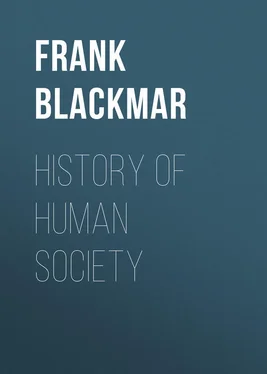Frank Blackmar - History of Human Society
Здесь есть возможность читать онлайн «Frank Blackmar - History of Human Society» — ознакомительный отрывок электронной книги совершенно бесплатно, а после прочтения отрывка купить полную версию. В некоторых случаях можно слушать аудио, скачать через торрент в формате fb2 и присутствует краткое содержание. ISBN: , Жанр: foreign_antique, foreign_prose, на английском языке. Описание произведения, (предисловие) а так же отзывы посетителей доступны на портале библиотеки ЛибКат.
- Название:History of Human Society
- Автор:
- Жанр:
- Год:неизвестен
- ISBN:http://www.gutenberg.org/ebooks/30610
- Рейтинг книги:3 / 5. Голосов: 1
-
Избранное:Добавить в избранное
- Отзывы:
-
Ваша оценка:
- 60
- 1
- 2
- 3
- 4
- 5
History of Human Society: краткое содержание, описание и аннотация
Предлагаем к чтению аннотацию, описание, краткое содержание или предисловие (зависит от того, что написал сам автор книги «History of Human Society»). Если вы не нашли необходимую информацию о книге — напишите в комментариях, мы постараемся отыскать её.
History of Human Society — читать онлайн ознакомительный отрывок
Ниже представлен текст книги, разбитый по страницам. Система сохранения места последней прочитанной страницы, позволяет с удобством читать онлайн бесплатно книгу «History of Human Society», без необходимости каждый раз заново искать на чём Вы остановились. Поставьте закладку, и сможете в любой момент перейти на страницу, на которой закончили чтение.
Интервал:
Закладка:
In the Lower Paleolithic in the pre-Neanderthal period, including what is known as the Chellean, new forms of implements are added to the earlier beginnings. Almond-shaped flint implements, followed later by long, pointed implements, indicate the future development of the stone spear, arrowhead, knife, and axe. Also smaller articles of use, such as borers, scrapers, and ploughs, appeared. The edges of all implements were rough and uneven, and the forms very imperfect.
Industrial and Social Life of Primitive Man . – In the industry of the early Neanderthal races (Acheulean) implements were increased in number and variety, being also more perfectly formed, showing the expansive art of man. At this period man was a hunter, having temporary homes in caves and shelters, which gradually became more or less permanent, and used well-fashioned implements of stone. At the close of the third interglacial period the climate was mild and moist, and mankind found the open glades suitable places for assemblages in family groups about the open fires; apparently the cooking of food and the making of implements and clothing on a small scale were the domestic occupations at this time. Hunting was the chief occupation in procuring food. The bison, the horse, the reindeer, the bear, the beaver, the wild boar had taken the place of the rhinoceros, the sabre-tooth tiger, and the elephant.
Judging from the stage of life existing at this time, and comparing this with that of the lowest living races, we may safely infer that the family associations existed at this time, even though the habitations in caves and shelters were temporary. 4 4 See Chapter VI .
"Yet, when at length rude huts they first devised,
And fires and garments; and in union sweet
Man wedded woman, the pure joys indulged
Of chaste connubial love, and children rose,
The rough barbarians softened. The warm hearth
Their frames so melted they no more could bear,
As erst, th' uncovered skies. The nuptial bed
Broke their wild vigor, and the fond caress
Of prattling children from the bosom chased
Their stern, ferocious manners."
Thus the Lower Paleolithic merged into the Upper; with the appearance of the Mousterian, Augrignacian, Solutrian, Magdalenian, and Azilian cultures followed the most advanced stage of the Neanderthal race before its final disappearance. The list of tools and implements indicates a widening scope of civilization. For war and chase and fishing, for industry and domestic life, for art, sculpture, and engraving, and for ceremonial use, a great variety of implements of stone and bone survived the life of the races.
Spears, daggers, knives, arrowheads, fish-hooks, and harpoons; hand-axes, drills, hammers, scrapers, planes, needles, pins, chisels, wedges, gravers, etchers, mortars, and pilasters; ceremonial staffs and wands – all are expressions of a fulness of industrial and social life not recognized in earlier races. Indications of religious ceremonies represent the changing mind, and the expression of mind in art suggests increased mental power.
Cultures Indicate the Mental Development of the Race . – As the art and industry to-day represent the mental processes of man, so did these primitive cultures show the inventive skill and adaptive power in the beginnings of progress. Perhaps instinct, emotion, and necessity figured more conspicuously in the early period than reflective thought, while in modern times we have more design and more planning, both in invention and construction. Also the primitive social order was more an unconscious development, and lacked purpose and directing power in comparison with present life.
But there must have been inventors and leaders in primitive times, some brains more fertile than others, that made change and progress possible. Who these unknown geniuses were human records do not indicate. In modern times we single out the superiors and call them great. The inventor, the statesman, the warrior, the king, have their achievements heralded and recorded in history. The records of achievement of the great barbarous cultures, of the Assyrians, the Egyptians, and the Hebrews, centre around some king whose tomb preserves the only records, while in reality some man unknown to us was the real author of such progress as was made. The reason is that progress was so slow that the changes passed unnoticed, being the products of many minds, each adding its increment of change. Only the king or ruler who could control the mass mind and the mass labor could make sufficient spectacular demonstration worth recording, and could direct others to build a tomb or record inscriptions to perpetuate his name.
Men of Genius Cause the Mutations Which Permit Progress . – The toiling multitudes always use the products of some inventive genius. Some individual with specialized mental traits plans something different from social usages or industrial life which changes tradition and modifies the customs and habits of the mass. Whether he be statesman, inventor, philosopher, scientist, discoverer, or military leader, he usually receives credit for the great progressive mutation which he has originated. There can be little progress without these few fertile brains, just as there could be little progress unless they were supported by the laborers who carry out the plans of the genius. While the "unknown man" is less conspicuous in the progress of the race in modern complex society, he is still a factor in all progress.
The Data of Progress . – Evolution is not necessarily progress; neither is development progress; yet the factors that enter into evolution and development are essential to progress. The laws of differentiation apply to progress as well as to evolution. In the plant and animal life everywhere this law obtains. In man it is subservient to the domination of intelligent direction, yet it is in operation all of the time. Some races are superior in certain lines, other races show superiority in other lines. Likewise, individuals exhibit differences in a similar way. Perhaps the dynamic physical or mental power of the individual or the race will not improve in itself, having reached its maximum. There is little hope that the brain of man will ever be larger or stronger, but it may become more effective through training and increased knowledge. Hence in the future we must look for achievement along co-operative and social lines. It is to social expansion and social perfection that we must look for progress in the future. For here the accumulated power of all may be utilized in providing for the welfare of the individual, who, in turn, will by his inventive power cause humanity to progress.
The industrial, institutional, humanitarian, and educational machinery represents progress in action, but increased knowledge, higher ideals of life, broader concepts of truth, liberty of individual action which is interested in human life in its entirety, are the real indices of progress.
1. Why do some races progress and others deteriorate?
2. Compare different communities to show to what extent environment determines progress.
3. Show how the airplane is an evidence of progress. The radio. The gasoline-engine.
4. Discuss the effects of religious belief on progress.
5. Is the mental capacity of the average American greater than the average of the Greeks at the time of their highest culture?
6. What are the evidences that man will not advance in physical and mental capacity?
7. Show that the improvement of the race will be through social activity.
CHAPTER III
METHODS OF RECOUNTING HUMAN PROGRESS
Difficulty of Measuring Progress . – In its larger generalization, progress may move in a straight line, but it has such a variety of expression and so many tributary causes that it is difficult to reduce it to any classification. Owing to the difficulties that attend an attempt to recite all of the details of human progress, philosophers and historians have approached the subject from various sides, each seeking to make, by means of higher generalizations, a clear course of reasoning through the labyrinth of materials. By adopting certain methods of marking off periods of existence and pointing out the landmarks of civilization, they have been able to estimate more truly the development of the race. Civilization cannot be readily measured by time; indeed, the time interval in history is of little value save to mark order and continuity. It has in itself no real significance; it is merely an arbitrary division whose importance is greatly exaggerated. But while civilization is a continuous quantity, and cannot be readily marked off into periods without destroying its movement, it is necessary to make the attempt, especially in the study of ancient or prehistoric society; for any method which groups and classifies facts in logical order is helpful to the study of human progress.
Читать дальшеИнтервал:
Закладка:
Похожие книги на «History of Human Society»
Представляем Вашему вниманию похожие книги на «History of Human Society» списком для выбора. Мы отобрали схожую по названию и смыслу литературу в надежде предоставить читателям больше вариантов отыскать новые, интересные, ещё непрочитанные произведения.
Обсуждение, отзывы о книге «History of Human Society» и просто собственные мнения читателей. Оставьте ваши комментарии, напишите, что Вы думаете о произведении, его смысле или главных героях. Укажите что конкретно понравилось, а что нет, и почему Вы так считаете.












